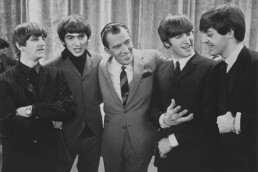It started modestly in the postwar metropolis of Liverpool, England. A group of young guys, united by their passion for American rock ‘n’ roll, founded a band that would eventually change the fabric of music and culture forever. They honed their skill in dusty club basements and dimly illuminated venues across Britain, growing from a scrappy adolescent skiffle trio to a phenomenon so massive that neither the Atlantic Ocean nor cultural barriers could contain their impact.
The road was not simple. Its core consisted of four persons, each one distinct but wonderfully complementary. When John Lennon, Paul McCartney, George Harrison, and eventually Ringo Starr got together, talent, ambition, and chance all converged. Under the leadership of visionary manager Brian Epstein and inventive producer George Martin, the band quickly climbed from local sensations to national superstardom. However, one could argue that this rapid rise was only a forerunner to what was to come.
By 1963, they had taken Britain by storm. Songs like “Please Please Me” and “She Loves You” topped the national charts, and its allure caused audiences to explode into wild shouting fits, a phenomenon later dubbed “Beatlemania.” However, the ultimate apex of their rising triumph remained over the seas. This story, like many great legends, was meant to transcend borders.
The band’s success in the United States did not arrive quickly. Throughout 1963, their songs struggled to acquire traction in America, and their appeal remained a well-kept British secret. However, by early 1964, everything had changed, thanks in part to increased interest fuelled by disc jockeys, a savvy marketing strategy, and possibly fate itself. By the time “I Want to Hold Your Hand” hit the American airways in late December 1963, the excitement had snowballed into an unstoppable force.
Their moment of reckoning arrived on 9th February 1964. That evening, 73 million people, or roughly 40% of the American population, tuned in to hear them perform live on The Ed Sullivan Show. It wasn’t just a broadcast musical performance; it was a cultural shock. Their enthusiasm, humour, and captivating songs provided a welcome break to a generation still reeling from the sobering blow of President Kennedy’s assassination just a few months prior.
The performance was electrifying, with young men in matching suits and mop-top haircuts emanating both easy sophistication and boy-next-door charm as they performed songs like “All My Loving” and “She Loves You.” The screaming fans in the studio crowd made it practically impossible to hear the music well, but that didn’t matter. This was more than just a concert; it was the beginning of a movement.
In the weeks that followed, their music became impossible to ignore. Singles reached many positions on American charts, their faces graced magazine covers, and their entrance in every place sparked pandemonium. This was the beginning of what would become known as “The British Invasion”—a cultural phenomenon in which bands and artists from the United Kingdom swamped the American market with music that reinvented rock ‘n’ roll.
But it wasn’t just about who topped the charts. This cultural interaction impacted the course of popular music by bridging the gap between American blues and rock influences and British pop tastes. The invasion’s ripple effect boosted the careers of several other bands, including The Rolling Stones and The Who, establishing the UK’s pivotal role in influencing worldwide pop music.
Despite the abundance of talent, there was something unearthly about the Liverpool quartet. Their ability to shift quickly—from syrupy love ballads to psychedelia and everything in between—distinguished them from their peers. Albums like “Rubber Soul” and “Revolver” pushed the boundaries of what a pop record might be, but “Sgt. Pepper’s Lonely Hearts Club Band” reinvented the album as an art form.
Those four Liverpool musicians had an impact that extended far beyond their music. The hysteria that followed them energised young people all across the world, resulting in a youth culture that was more outspoken, autonomous, and expressive than ever before. Their attitude of experimentation pushed others to challenge the status quo, laying the groundwork for the late 1960s counterculture revolution.
They did more than just write songs; they changed fashion, inspired cinema, and shaped attitudes. Their sense of humour, confidence, and brilliance established them as speakers for a generation seeking identity and purpose in a constantly changing world. Whether they were criticising talk-show hosts or directly facing political concerns, their appeal was based on personality as much as harmony.
Their legacy, however, was not without obstacles. As their celebrity grew, so did the demands of stardom. In 1966, they decided to quit touring due to weariness and discontent with the expectations placed on them. Even as they retired to the studio, their inventiveness only grew. Albums like “The White Album” and “Abbey Road” demonstrated a maturity that demonstrated they had progressed above mere pop stardom to become cultural and creative legends.
Although their adventure ended abruptly in 1970 with their separation, their influence grew stronger in the years that followed. Together, they had redefined what a band could accomplish. Individually, they pursued solo careers, pushing musical limits in their own unique ways.
Their innovations continue to have an impact today. Modern musicians of various genres credit them as a major influence, and their albums continue to sell millions. The sense of possibilities they embodied—the conviction that music might be both accessible and pioneering, joyful and introspective—is still a yardstick for artists in the twenty-first century.
They did not simply overrun America or rule the globe stages. They went beyond music, developing a shared language of culture and connection during a period of significant social change. From that tragic night on American television until their ultimate departure as a group, the Liverpool quartet demonstrated that music has an unequalled potential to inspire, unify, and cause change. Their tale may have ended decades ago, but their songs—and the revolution they sparked—will definitely outlast us all.



